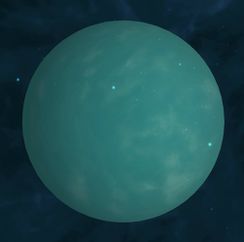
|
This wiki is closed in favour of the new wiki. Information shown is likely to be very out of date. |
Difference between revisions of "Planet Nile"
From Discovery Wiki
Jump to navigationJump to search (Created page with "{{Version|4.89.2}} {{Planet Infobox | name = Planet Nile | image = .jpg | owner = | system = Omicron Epsilon | sector = B6/7 | house = Edge Worlds | population = | d...") |
m (category added) |
||
| (One intermediate revision by the same user not shown) | |||
| Line 1: | Line 1: | ||
| − | {{Version|4. | + | {{Version|4.91}} |
{{Planet Infobox | {{Planet Infobox | ||
| name = Planet Nile | | name = Planet Nile | ||
| − | | image = .jpg | + | | image = Planet Nile.jpg |
| owner = | | owner = | ||
| − | | system = [[Omicron | + | | system = [[Omicron Mu]] |
| sector = B6/7 | | sector = B6/7 | ||
| house = [[Edge Worlds]] | | house = [[Edge Worlds]] | ||
| Line 15: | Line 15: | ||
| escape_velocity = 8.04 km/s | | escape_velocity = 8.04 km/s | ||
}} | }} | ||
| + | A large aquatic yet inhospitable planet, Nile is a mostly unexplored world hidden deep within Wall of Seth. High pressure and chemical components present within both [[Water]] and atmosphere rule out the possibility of sustaining human life but [[Order]] scientists do not exclude the possibility of simple organisms living in the planet's oceanic depths. | ||
| − | |||
[[Category: Edge Worlds]] | [[Category: Edge Worlds]] | ||
| − | [[Category: | + | [[Category: Omicron Mu]] |
Latest revision as of 08:45, 23 February 2019
| Planet Nile | |
| Location | B6/7, Omicron Mu Edge Worlds |
| Technical information | |
| Docking | No |
| Terrain | Water |
| Diameter | 12,097 km |
| Mass | 5.61 x 10^24 kg |
| Temperature | 68°C to 185°C |
| Escape velocity | 8.04 km/s |
A large aquatic yet inhospitable planet, Nile is a mostly unexplored world hidden deep within Wall of Seth. High pressure and chemical components present within both Water and atmosphere rule out the possibility of sustaining human life but Order scientists do not exclude the possibility of simple organisms living in the planet's oceanic depths.
